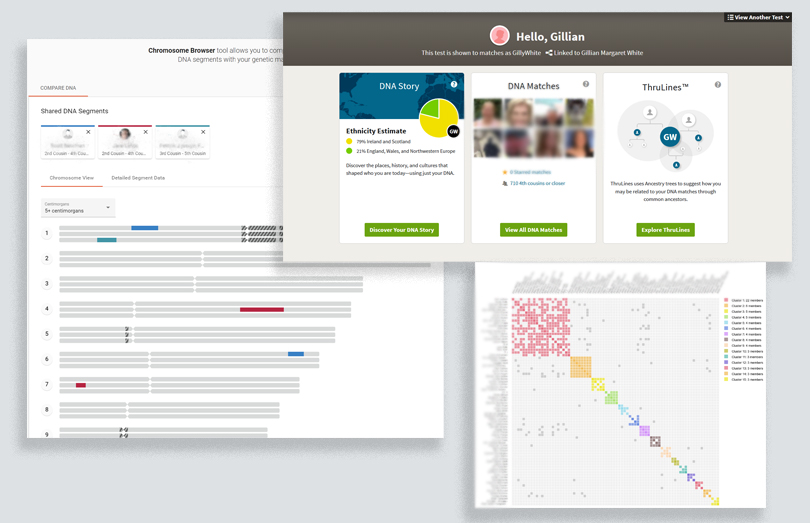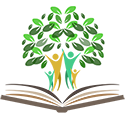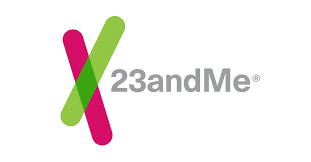DNA TESTING FOR GENEALOGY
Guide to DNA testing
DNA is a relatively new development that can help you with your family history research.
You may have seen the adverts and want to explore how DNA can help with your research but are unsure where to begin. There are plenty of different companies that want your money but which is best for your needs?
Or have you already tested and now don’t know what to do with the results?
Please get in touch for a free 1/2 hour consultation and personal advice.
WHAT IS DNA?
DNA is found in every living cell in your body. The stuff we are concerned with are the Chromosomes (blocks of DNA).
Humans have 23 pairs arranged as a double Helix.
You get 1/2 of your chromosomes from your mother (23) and 1/2 from your father (23). They in turn got their DNA from their parents.
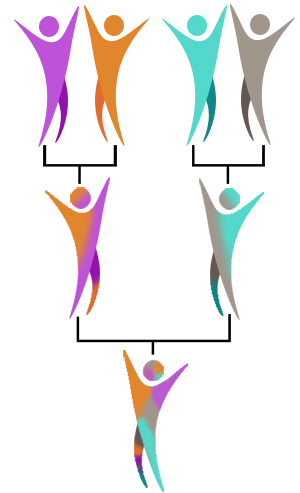
The 23rd Chromosome is your sex Chromosome.
Females get two X- chromosomes one from their mother and one from their father.
Males get one X-chromosome from their mother and one Y-chromosome from their father
HOW DOES THIS HELP ME?
DNA in Genealogy is an additional tool, it is not the answer to all your genealogical puzzles or a substitute for good research.
It is however a great way to help break down those brick walls, discover your ‘deep’ ancestry and conect with other relatives who have also tested their DNA.
It can be used prove relationships that you think might exist, it can confirm relationships you are already aware of and it can lead to a wealth of new discoveries. It can also help prove a negative (that A is not the father of B).
DNA can be used in the search of adoptive parents and long lost family alongside more traditional research methods, and where the paper trail has come to a dead end or where there is unknown or uncertain parentage.
It can be used to trace the paternal line far back in time and can, in most cases, show the geographic origins of your ancestors and their ethnicity.
The type of test you take will determine the type of information you get.
WHAT NEXT?
The first thing you need to decide is what you would like your DNA to tell you. Then how it will fit in with your existing research. For the DNA test to be meaningful you need to have a family tree already researched and created.
Take a look at the types of test available to help you decide which you need.
WHAT DNA CAN HELP WITH
Finding Family
Having your DNA tested with a genealogy company will allow you to make matches with other people who have already tested. The number of matches you will get, will depend on the number of people in the database that are related to you. This is where size matters! Clearly the more people in the database the better the chance of making a match.
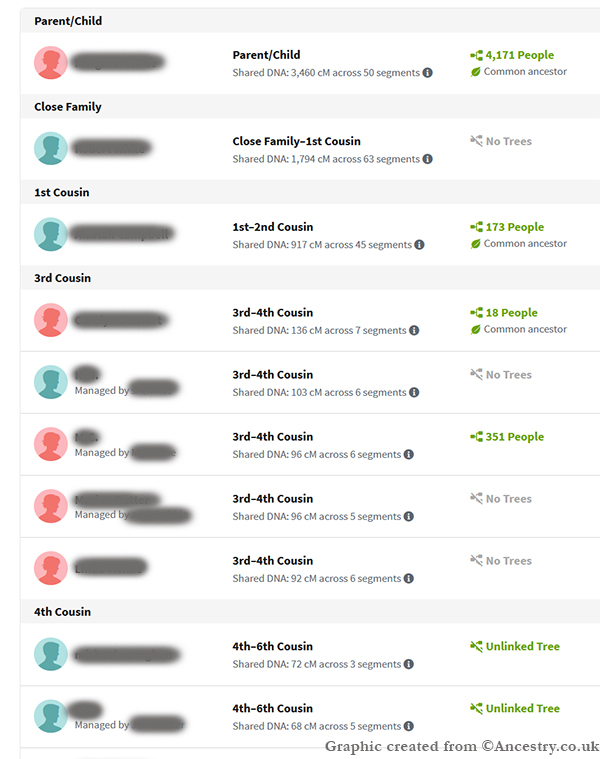
How useful the match is will depend on what information they have and what they are prepared to share. Not everyone who has tested will have information to share with you and others may not want to contact you or have you contact them.
This image above shows the type of match information you will receive, how closely the matches are related to you and, as you can see, not everyone has a published family tree to share.
Whether you are seeking others who share an Ancestor with you to further your research or you are looking for your own parents and/or siblings, it is all about finding as many matches as you can who are as closely related to you as possible.
Find origins and ethnicity
All the main companies will give you an ethnicity report. This is an estimate based on a number of sample references, once again size matters!
These estimates are improving over time as the panels that your DNA is compared are increasing in size, but please remember they are an estimate. The science behind these estimates is good, but limited until there are much larger reference samples available. As you can see below, European Ancestry can be difficult to pinpoint exactly.
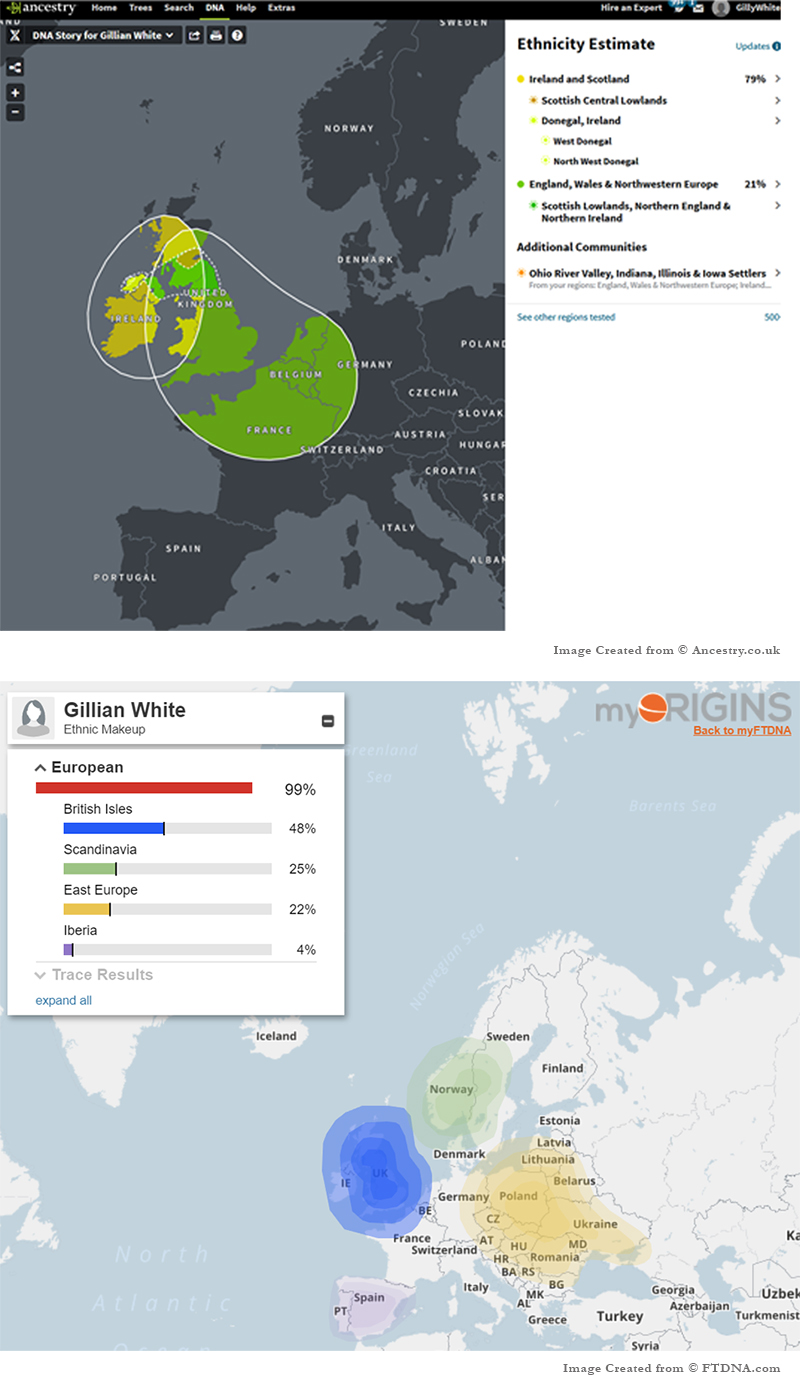
If you test with more than one company, the estimates will vary slightly from company to company, it is not yet an exact science and can only be taken as a guide.
These are my ethnicity results from 2 different companies – similar, but different…
TYPES OF DNA TESTS FOR GENEALOGY
There are 3 main types of DNA tests you can take to help you with your Family History Research. Each contains different information.
AUTOSOMAL, Y-DNA and MITOCHONDRIAL or mtDNA
AUTOSOMAL DNA TESTING
The most useful (as a rule) and most commonly used is Autosomal testing and is the one that all the major testing companies offer.
This is the DNA that you inherit from all lines of your ancestors and is the test that is used to match you with your genetic relatives. Autosomal DNA is also the basis of your ethnicity estimate. The most useful test for family tree research.
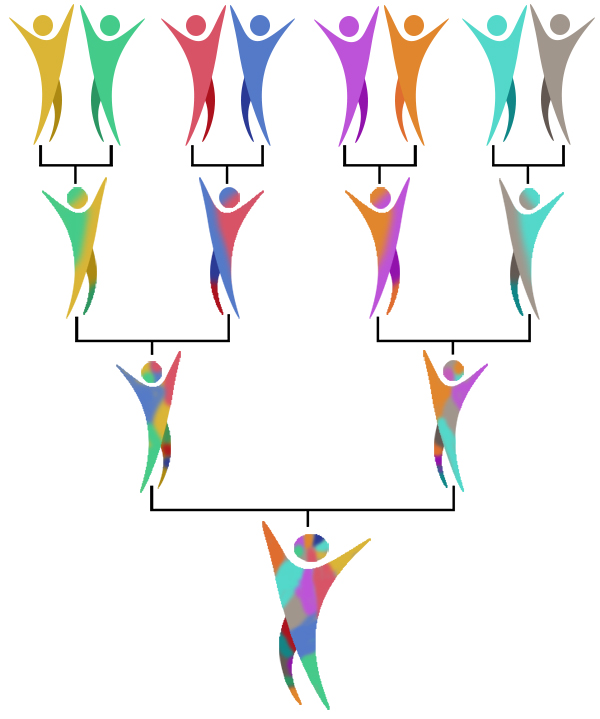
Y-DNA TESTING
Y-DNA tests look at the Y-chromosome which is only carried by males.
Females who want YDNA informaton will have to find a male relative to take the test. This can be either a father, brother, uncle or cousin of the line you want to investigate.
The Y-chromosone is carried, unchanged from father to son which is what makes it useful for tracing a surname lineage far back in time.
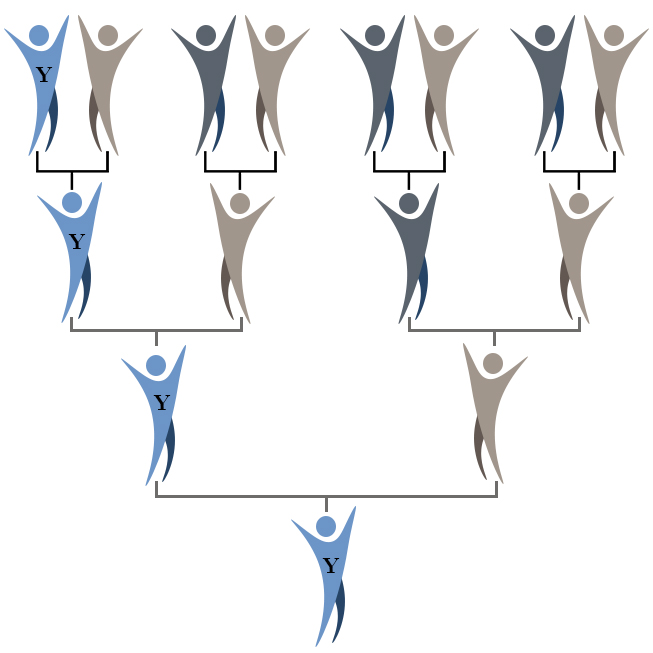
mtDNA TESTING
Mitochondrial DNA is passed from a mother to all of her children, both male and female. It only passes down from a female, so although a mother passed her mtDNA to her son, he cannot pass it on.
Like Y-DNA it passes virtualy unchanged and can be used to trace a female line back for many, many generations.
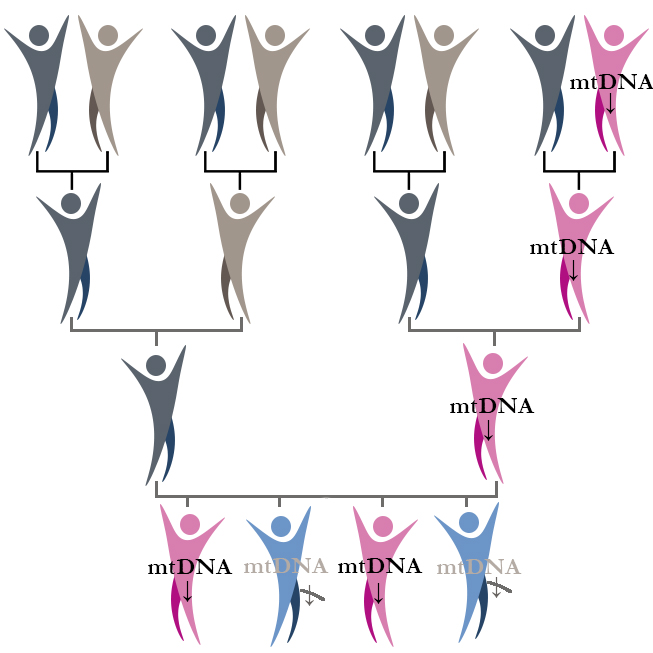
For more in-depth information please read the FAQ and look in the Articles section.
WHICH COMPANY?
A quick search on Google will give you many choices, but for making matches and using DNA to take your family tree research further then you need to look at the big companies with large databases.
Most of these companies have been about for many years and are considered to be reputable and are popular with those tracing their family trees.
Choosing a small company will limit the usefulness of the test.
The more databases you have your family tree and DNA stored in, the better your chance of finding matches and taking meaningful steps.
The ‘BIG’ five are Ancestry, FamilyTreeDNA, 23andMe, MyHeritage and LivingDNA
ANCESTRY

Ancestry is probably the best known and is certainly the largest of the companies offering DNA testing.
It has the largest database with over 12 million DNA tests taken and many more millions of shared family trees.
If you want to make as many matches as possible then Ancestry is the place to have an Autosomal DNA test taken and stored.
It does not however allow for uploads of other DNA tests and does not have Y-DNA tests or mtDNA tests.
Cost: £79 for test. You have the further option of paid annual membership but you do not need to have one to make matches and get your ethnicity results.
FAMILYTREEDNA
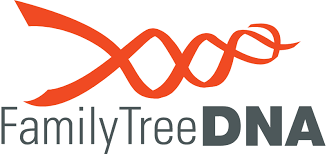
Family Tree DNA offers autosomal testing (Family Finder) , Y-DNA and mtDNA testing and offers a variety of tools and reports as well as matching and family tree services. Database not as large as Ancestry yet, but growing and exensive.
FTDNA has many useful tools not found on other sites and is most used by professionals. It also accepts uploads from other testing companies. You can test with Ancestry and then upload to FTDNA and add Y-DNA for example.
All costs are in US Dollars.
Cost: Autosomal $79, Y-DNA prices vary depending on the amount of markers tested starting at $169 for 37 markers and rising to $649 for 700 markers. You can start low and gradually upgrade without resending a sample. mtDNA $199.
Upload a test and activate all tools $19
LIVING DNA
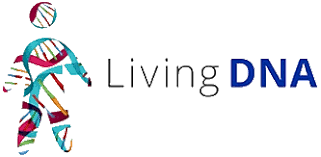
LivingDNA is a newer kid on the block and offers includes a matching service. Not certain of number in the Database but as it has now partnered with Findmypast this will potentially allow it to grow to a similar size to Ancestry. You can link your Finmypast account if you have one to your LivingDNA account.
Their test offers all three types of test with one payment so is great value for money. There is little detail about the Y-DNA test so I can’t yet determine how many markers it tests, but I will update this when I hear back from them.
LivingDNA allows you to upload your test taken with other companies at no cost.
Cost: £99 Can be combined with FindmyPast membership which is a subsciption site.
23ANDME
23andMe offers autosomal testing and family matching. Their database is around 1 million users. It also offers genetic health screening which for many people is the primary reason for using them, so many of those in the database have no interest in family history and matching, making the database shrink from a genealogy point of view.
Cost: £79 or £149 with Health screening
MY HERITAGE

My Heritage offers autosomal testing with family matching, the Database is much smaller than Ancestry or Family Tree DNA (around 1.5 million). It has some good additional tools like clustering but not enough people in the Database yet to make it meaningful. Allows uploads from other companies, so as people upload their database will grow.
Cost: £79 You have the further option of paid annual membership but you do not need to have one to make matches and get your ethnicity results. Record sets mostly available on other sites, making their paid subsrciptions less valuable than others.
You can upload DNA at no cost.
Please note I am not affiliated in any way with any of the above companies and clicking on any of the links does not generate any income for me.
NEXT STEPS
Having your DNA testing is just the beginning of your journey. Like most things, the more work you put in the more you will find.
Once you have tested with your chosen company and have your results available you can start putting the DNA data to work.
First make sure you have a family tree created or uploaded to the site – this allows you to try to work out where your matches fit in with your family and allows others to work out where you fit in with them.
Next upload your DNA to other sites. FamilyTreeDNA, MyHeritage, LivingDNA and Gedmatch all let you upload your raw DNA for matching on their sites.
If you are a member of FindmyPast link your LivingDNA account.
The more databases you are in, the better your chances of matching are.
Now you can start going through your matches, looking at their family trees where they are available. This may give you many more leads and places to look for those elusive ancestors or bring lines forward in time. Look for common ancestors, surnames and even localities. You will certainly find new family members all of whom potentially have more information.
DON’T just take the information someone else has without checking it – it may be wrong, it may be copied from someone else and like Chinese whispers errors carry on and multiply. Use the information other people have as a starting place for more research.
Start contacting people, explain who you are, where you think you fit in and where they might fit in, some people may not respond, others may have no information, but persevere.
If you have your Y-DNA tested join some projects who are also studying your surname.
REMEMBER DNA is a tool to help you find answers but does not give you a ready made family tree, yet…
There are a number of third party tools and web sites that will help you take your DNA research further. Look out for our Articles on these in the near future.
Pricing
Free 1/2 hour telephone or email consultation. I will try to help you decide what to do next and help you formulate a plan for your DNA results. I can help you decipher your results and advise on third party tools I can offer tuition on the registration, use and uploading to other sites and help you to get the most from your results.
Using DNA in your research is exiting and enlightening, but it is a project that needs work over time to get the best from it.
NOTE: You may find out things that are unexpected or upsetting so be prepared for this.
